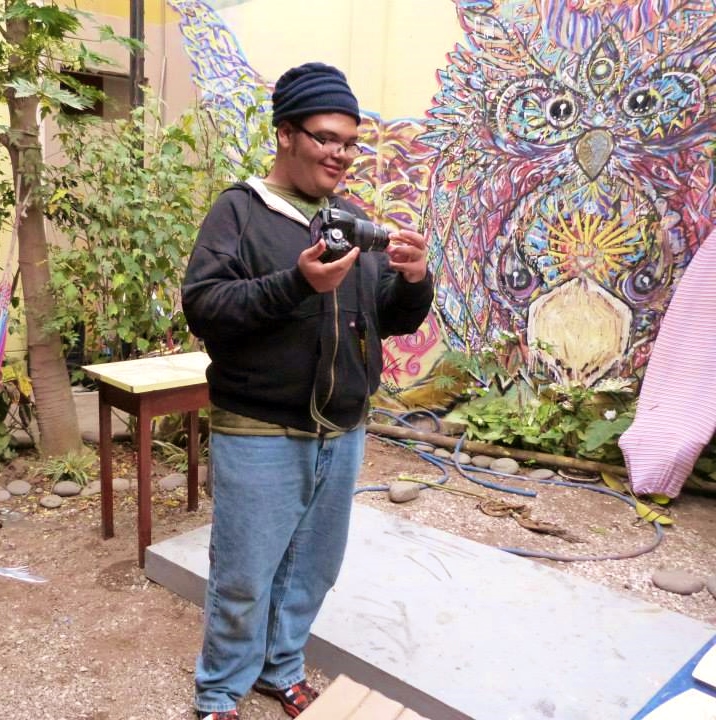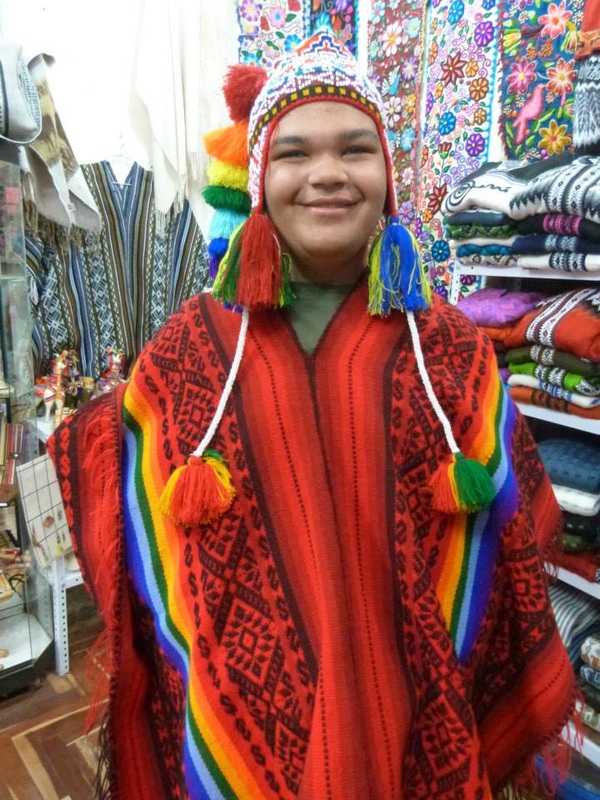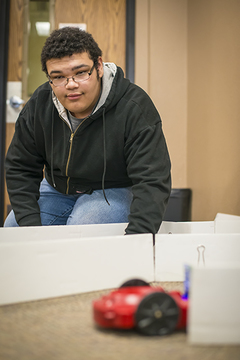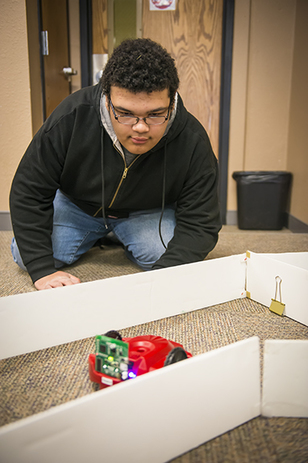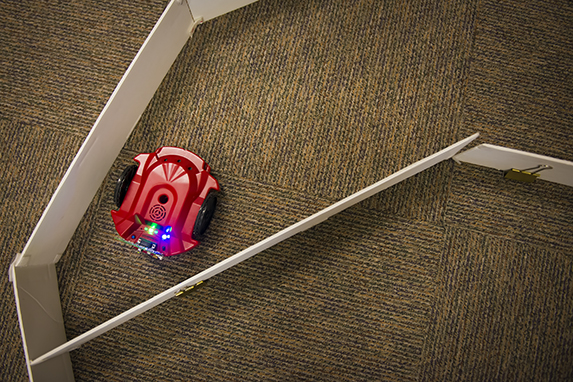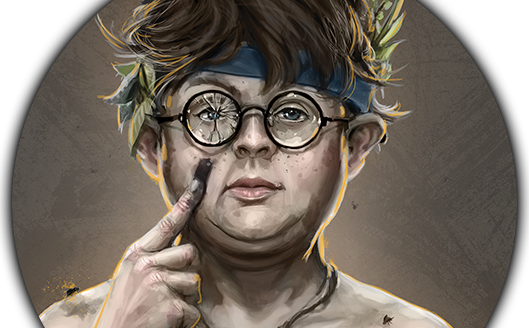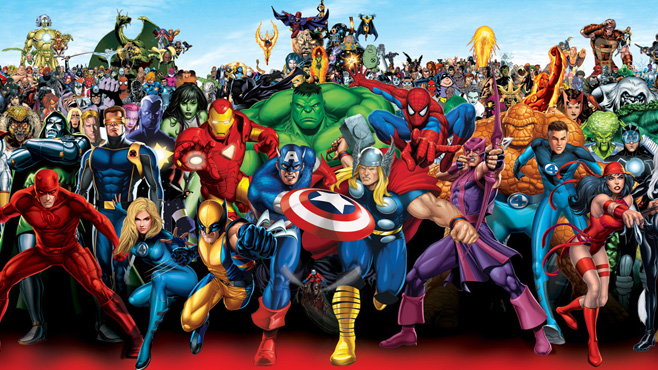Sophomore Samba
Having made it through our first year, we entered into our second full of confidence, certain the way would be smooth and life would be grand. The reality, well, that's a fish of a different color. Sir Talks A Lot is not social the way that so many of his age mates are. He doesn't text, insta-anything, watch or do sports. He had a pay as you go cell phone for the last year and ran out of time long before he ran out of minutes. I would think he was planning a life of asceticism and solitude except for the video games. Every night, my son the wallflower becomes a rowdy, uber-social, kick butt and take no prisoners godfather of games. He growls and yells and hoots and hollers and says words that singe the ears until the wee hours of the morning. Some might argue that I should, perhaps, put a stop to it. I, on the other hand, see it all as a part of his normal development and even as a part of his education. You see, I didn't learn effective time management skills until long after I was in college, and by that time my night owl ways were definitely in conflict with my need to make it to eight o'clock classes. I survived, but I remember my time then as a series of avoidable almost disasters. So, this year we're working on his learning how to plan, organize and be responsible while maintaining relationships with others. Oh, and there's tons of school stuff too.
ScienceSir Talks A Lot's dual interests in anthropology and botany have persisted into this year. As a consequence, he enrolled in a couple of online courses in anthropology and botany for science during the first semester. All of the courses were MOOCs (Massive Open Online Course), and he enjoyed experiencing how different the courses were depending on the particular school. Sir found navigating the courses very difficult since it was a format he was unused to. Most of the time he would complete the quizzes and then not submit them. Instead, he would come to me and tell me about what he had learned, ask questions and do follow-up research. Note to self: make sure Sir understands how to take courses with other people.
Anthropology: Becoming Human: Anthropology (BeHuman) by Assoc. Prof. Greg Downey [Macquarie University, New South Wales, Australia] [5/8 to 7/7/2014] Gain an introductory understanding of evolution, including how we evolved from primates and became human. https://www.open2study.com/courses/becoming-human-anthropology?nocache=1 Anthropology of Current World Issues [1 Sep 2014, 8 weeks] University of Queensland This course will allow you to better understand the world around you through utilizing the anthropological lens. You will learn about the way in which anthropology as a discipline can shed new perspectives on current world issues, from indigeneity to migration and material culture. We will interview notable anthropologists and follow some around the world and into their field to explore the issues, the people they work with and their place in the world. Gerhard Hoffstaedter, course director of World101x /Lecturer in Anthropology; David Trigger, Professor of Anthropology; Anna Cristina Pertierra, Lecturer in Anthropology; Annie Ross, Associate Professor in Anthropology and Archaeology, Sally Babidge, Senior Lecturer in Anthropology https://www.edx.org/course/uqx/uqx-world101x-anthropology-current-world-1666#.U7BfcfldV8F |
|
Of the two, his favorite course was the Being Human. He loved how the course was put together and found the lectures extremely interesting and well done. He also enjoyed the Anthropology of Current World Issues, but he didn't really do the projects (I didn't require it), and felt awkward participating in the forums. All the same, he came away from the courses truly inspired.
 Indian Paintbrush
(photo taken 2012 at Vedauwoo State Park as part of Sir's Wildflowers of Wyoming project)
Indian Paintbrush
(photo taken 2012 at Vedauwoo State Park as part of Sir's Wildflowers of Wyoming project)
After the Anthropology course had concluded, we stumbled into the absolutely fantastic course taught by Daniel Chamowitz entitled "What A Plant Knows." Sir Talks Alot already had his book of the same title in the "to be read" queue, so he was eager to take the course. He certainly wasn't disappointed. He said that it is the BEST COURSE HE HAS EVER TAKEN IN HIS ENTIRE LIFE!
Botany:
What a Plant Knows (and other things you didn’t know about plants) Daniel Chamovitz, Tel Aviv University and Aviva Katz, Tel Aviv University; Oct 26-Dec 14
Can we say that plants have senses? You will learn how plants sense their environment and how scientists study plant senses. You will be exposed to both classic and modern experiments in plant biology, and may even start to question what defines us as humans.
This class has three main goals: 1. To introduce you to basic plant biology by exploring plant senses (sight, smell, hearing, touch, taste, balance). 2. To introduce you to biological research and the scientific method. 3. To get the student to question life in general and what defines us as humans.
https://www.coursera.org/course/plantknows
Botany:
What a Plant Knows (and other things you didn’t know about plants) Daniel Chamovitz, Tel Aviv University and Aviva Katz, Tel Aviv University; Oct 26-Dec 14
Can we say that plants have senses? You will learn how plants sense their environment and how scientists study plant senses. You will be exposed to both classic and modern experiments in plant biology, and may even start to question what defines us as humans.
This class has three main goals: 1. To introduce you to basic plant biology by exploring plant senses (sight, smell, hearing, touch, taste, balance). 2. To introduce you to biological research and the scientific method. 3. To get the student to question life in general and what defines us as humans.
https://www.coursera.org/course/plantknows
|
Biology:
We've struggled to find a good source for Biology this semester. We've started off using the online curriculum here: Quarks and Quirks, and putting our own spin on things with additional interactive projects. In the interest of making is communication easier and in case others would like to follow along with our studies, I have posted materials to this site. |
Foreign Travel
So, what do you do with a boy who loves ancient cultures, meeting new people, finding new cuisines, exploring ancient architectures and learning about sacred plants? Why, you send him to Peru, of course. Last year, we were full of anxiety and dread when we sent Sir out into the world without us for the first time. He came back a more resilient and self-reliant person. This year, we felt it was time for him to explore some of his passions and achieve some of his dreams. Fortunately for us, Lainie Liberti provides the opportunity for teens to do exactly that via her Project World School retreats.
|
|
Schedule: *Day 1 – Arrive in Lima- Meet and greet
Day 2 – Ceviche & Ice Breakers through Improv Day 3 – Explore Lima – Culture & History Day 4 – Travel to Cusco & the Sacred Valley Day 5 – Pisac Traditional Cooking Day 6 – Llamas & Condors Day 7 – Cusco, Qoricancha, Chocolate Making Day 8 – Sacred Plants, Nature Walk, Market Day 9 – Home-stay at local Andean farm Day 10 – Farm, prepare chicha Day 11 – Local Andean cooking & history- Prepare Cuy Day 12 – Return to retreat center in morning Free Day Day 13 – Hike through Pisac ruins Day 14 – Day of Music, Andean flute making & traditional music concert Day 15 – Day hike, Moray & Moras Day 16– Explore Ollantaytambo & Chinchero Ruins Day 17 – Explore the Caves, Zone X & Temple of the Moon Day 18 – Trip to the cloud forest conservation center Day 19– Birds, insects and orchids Day 20 – Machu Picchu Day 21 – Despacho Blessing for Pachamama (Mother Earth) & Closing Ceremony Day 22 – Board national flight from Cusco to Lima, then return board flights back to your home country |
Health

Cooking:
I started letting Sir Talks A Lot cook as a part of my evil scheme to introduce variety into his diet. Can we say "fruit"? "Vegetables," perhaps? While that was largely unsuccessful, his interest in cooking caught fire, and it's a subject he's covered every year. He began his course of study this year by attending a fantastic series of cooking classes for middle school and high school students (Foodies). Even though it meant driving an hour and a half in each way, it was worth it. The class involved instruction not only in cooking methods, but also provided insight about how to assess ingredients and why certain foods blend well. He attended for 5 months from June to October until the Wyoming weather finally got the best of us.
Food and Nutrition:
The next course that Sir Talks A Lot took is a lot more difficult to categorize. Using the book The Omnivore's Dilemma (Young Reader's Edition) by Michael Pollan which delves into the environmental impact of our food choices, the course combines sociology and health with an emphasis on argument and composition. Unfortunately, the book was more opinion than fact, and was rife with scientific inaccuracies. This course was one that is best taken by those who already subscribe to the author's viewpoint rather than those who legitimately want to explore new ideas or ask questions.
The Omnivore's Dilemma Course – [Feb 23 to Mar 30] Monday 10 am
We will be reading The Omnivore’s Dilemma, Young Reader Edition, by Michael Pollan. Michael Pollan is one of the most influential and interesting writers of our time. His books turn “What’s for dinner?” into a complicated and exciting journey. Each week, students will have a reading assignment and Comprehension Questions for the reading. Students will also be offered an essay assignment that will be corrected with audio comments and returned to them so that they can create a polished final draft.
http://www.onlineclassesforgroovykids.org/the-omnivores-dilemma-course.html
I started letting Sir Talks A Lot cook as a part of my evil scheme to introduce variety into his diet. Can we say "fruit"? "Vegetables," perhaps? While that was largely unsuccessful, his interest in cooking caught fire, and it's a subject he's covered every year. He began his course of study this year by attending a fantastic series of cooking classes for middle school and high school students (Foodies). Even though it meant driving an hour and a half in each way, it was worth it. The class involved instruction not only in cooking methods, but also provided insight about how to assess ingredients and why certain foods blend well. He attended for 5 months from June to October until the Wyoming weather finally got the best of us.
Food and Nutrition:
The next course that Sir Talks A Lot took is a lot more difficult to categorize. Using the book The Omnivore's Dilemma (Young Reader's Edition) by Michael Pollan which delves into the environmental impact of our food choices, the course combines sociology and health with an emphasis on argument and composition. Unfortunately, the book was more opinion than fact, and was rife with scientific inaccuracies. This course was one that is best taken by those who already subscribe to the author's viewpoint rather than those who legitimately want to explore new ideas or ask questions.
The Omnivore's Dilemma Course – [Feb 23 to Mar 30] Monday 10 am
We will be reading The Omnivore’s Dilemma, Young Reader Edition, by Michael Pollan. Michael Pollan is one of the most influential and interesting writers of our time. His books turn “What’s for dinner?” into a complicated and exciting journey. Each week, students will have a reading assignment and Comprehension Questions for the reading. Students will also be offered an essay assignment that will be corrected with audio comments and returned to them so that they can create a polished final draft.
http://www.onlineclassesforgroovykids.org/the-omnivores-dilemma-course.html
Your browser does not support viewing this document. Click here to download the document.
Mathematics
Algebra 2/Trigonometry:
Sir Talks A Lot hit a big brick wall this year with math. For the first time, he found himself unable to compensate for his learning differences. We were still using Math Without Borders (David Chandler, lecturer) and combined this with the recommended text, Algebra and Trigonometry: Functions and Applications by Paul A. Foerster, but the poor guy was struggling. Hubby had great intentions of teaching Sir, but found himself swamped with students to mentor, papers to write and jury, classes to teach, and committees to serve upon. So, more than halfway through the year, we switched midstream to Chalk Dust College Algebra with Professor Dana Mosley. We decided to buy it based on the demos. All of us liked how thorough the lectures seemed to be and how clearly the mathematical concepts were explained. Dana Mosely is also responsible for the CoolMathGuy online math instruction series, which appears to be an online version of the math DVDs that we purchased.
Sir Talks A Lot hit a big brick wall this year with math. For the first time, he found himself unable to compensate for his learning differences. We were still using Math Without Borders (David Chandler, lecturer) and combined this with the recommended text, Algebra and Trigonometry: Functions and Applications by Paul A. Foerster, but the poor guy was struggling. Hubby had great intentions of teaching Sir, but found himself swamped with students to mentor, papers to write and jury, classes to teach, and committees to serve upon. So, more than halfway through the year, we switched midstream to Chalk Dust College Algebra with Professor Dana Mosley. We decided to buy it based on the demos. All of us liked how thorough the lectures seemed to be and how clearly the mathematical concepts were explained. Dana Mosely is also responsible for the CoolMathGuy online math instruction series, which appears to be an online version of the math DVDs that we purchased.
Photography/Art
History of Photography:
It seemed as though The Camera Never Lies was tailor-made for Sir Talks A Lot. It combined history, photography and extended meditations on the nature of truth and perception and queries about control of the access to knowledge - many of his favorite things. Therefore, while it was quite true that he was unaware of most of the history going into the class, I expected Sir Talks A Lot to be thrilled with learning new things. Unfortunately, he found the professor boring and overly pedantic. He felt that many of the lectures focused on minutia to the detriment of the topic. The silver lining is that Sir Talks A Lot learned that not all teachers are interesting, and that boredom is not a fatal condition.
The Camera Never Lies (Coursera) Emmett Sullivan, University of London; Aug 4-Sep15
Film, images & historical interpretation in the 20th century for those who have a general interest in photojournalism, and films based on historical events. This short course is an introduction to use of photographs as historical evidence in the twentieth century, issues of authenticity and manipulation, and the place of film and historical adoptions as public history.
Week 1: The Camera Never Lies - Introduction
Week 2: Images and History in the Twentieth Century
Week 3: The Air-Brushing of History: Stalin and Falsification
Week 4: Photojournalism, Authenticity and Matters of Public Acceptability - The Battle of Mogadishu
Week 5: The Power of the Image - Mount Suribachi, 1945
Week 6: From Page to Screen - Film as Public History
https://www.coursera.org/course/lyingcamera
It seemed as though The Camera Never Lies was tailor-made for Sir Talks A Lot. It combined history, photography and extended meditations on the nature of truth and perception and queries about control of the access to knowledge - many of his favorite things. Therefore, while it was quite true that he was unaware of most of the history going into the class, I expected Sir Talks A Lot to be thrilled with learning new things. Unfortunately, he found the professor boring and overly pedantic. He felt that many of the lectures focused on minutia to the detriment of the topic. The silver lining is that Sir Talks A Lot learned that not all teachers are interesting, and that boredom is not a fatal condition.
The Camera Never Lies (Coursera) Emmett Sullivan, University of London; Aug 4-Sep15
Film, images & historical interpretation in the 20th century for those who have a general interest in photojournalism, and films based on historical events. This short course is an introduction to use of photographs as historical evidence in the twentieth century, issues of authenticity and manipulation, and the place of film and historical adoptions as public history.
Week 1: The Camera Never Lies - Introduction
Week 2: Images and History in the Twentieth Century
Week 3: The Air-Brushing of History: Stalin and Falsification
Week 4: Photojournalism, Authenticity and Matters of Public Acceptability - The Battle of Mogadishu
Week 5: The Power of the Image - Mount Suribachi, 1945
Week 6: From Page to Screen - Film as Public History
https://www.coursera.org/course/lyingcamera
 https://supermother.wordpress.com/2011/06/15/make-money-with-digital-photography/
https://supermother.wordpress.com/2011/06/15/make-money-with-digital-photography/
Photography:
Despite the fact that Sir Talks A Lot is our unofficial family photographer, his skills have plateaued in a way that frustrates him. Luckily, The Great Courses company had a lovely sale on two of their National Geographic photography courses: Fundamentals of Photography and Masters of Photography. The first course contains a good deal of review combined with new topics. Our goal is to finish the first course this semester, and begin the second next year.
Despite the fact that Sir Talks A Lot is our unofficial family photographer, his skills have plateaued in a way that frustrates him. Luckily, The Great Courses company had a lovely sale on two of their National Geographic photography courses: Fundamentals of Photography and Masters of Photography. The first course contains a good deal of review combined with new topics. Our goal is to finish the first course this semester, and begin the second next year.
History
American History 1: Exploration to Reconstruction
Usually I write our own history curriculum, but I stumbled upon the Worldview Software resource (see Homeschoolbuyers for a discount) which is broken down into chapters like a textbook and provides a chapter overview, tutorials, study materials, copies of original documents and first hand materials, essay topics, web searches and projects, and tests. With this wealth of material, I thought, surely we have *solved* history for the year. It soon became apparent, however, that a textbook is a textbook is a textbook, and I needed to find other resources to supplement the curriculum in order to keep Sir Talks A Lot engaged. So, we've added novels, interactive workbooks, lectures, videos, documentaries, and text materials. As we proceed through the semester, I will upload many of the resources we use to the website.
Usually I write our own history curriculum, but I stumbled upon the Worldview Software resource (see Homeschoolbuyers for a discount) which is broken down into chapters like a textbook and provides a chapter overview, tutorials, study materials, copies of original documents and first hand materials, essay topics, web searches and projects, and tests. With this wealth of material, I thought, surely we have *solved* history for the year. It soon became apparent, however, that a textbook is a textbook is a textbook, and I needed to find other resources to supplement the curriculum in order to keep Sir Talks A Lot engaged. So, we've added novels, interactive workbooks, lectures, videos, documentaries, and text materials. As we proceed through the semester, I will upload many of the resources we use to the website.
Foreign Language
Latin:
Once again we are using the Ecce Romani books and workbooks published by Prentice Hall. I still like the blend between Latin immersion combined with instruction in English. Sir Talks A Lot enjoys the translations and finds the antics of the Cornelius family to be interesting. This year we are also using some additional resources for grammar. Latin 101: Learning a Classical Language is a Great Courses class taught by Professor Hans-Friedrich Mueller which contains 36 lectures to help clarify Latin. We've just started listening to the lectures, and I find Professor Mueller to be a lively lecturer. The jury is still out on the boy's opinion. Sometimes we just need a brief review of a concept, and I really like the LatinTutorial videos on YouTube. Here's a video on the subjunctive.
Once again we are using the Ecce Romani books and workbooks published by Prentice Hall. I still like the blend between Latin immersion combined with instruction in English. Sir Talks A Lot enjoys the translations and finds the antics of the Cornelius family to be interesting. This year we are also using some additional resources for grammar. Latin 101: Learning a Classical Language is a Great Courses class taught by Professor Hans-Friedrich Mueller which contains 36 lectures to help clarify Latin. We've just started listening to the lectures, and I find Professor Mueller to be a lively lecturer. The jury is still out on the boy's opinion. Sometimes we just need a brief review of a concept, and I really like the LatinTutorial videos on YouTube. Here's a video on the subjunctive.
|
|
|
Programming
|
Over the summer, I was talking to a neighbor of mine who works at the University about Sir Talks A Lots' interest in programming. In a wonderful example of kismet, it turns out that he leads a Robotics Club at the university for students in which the kids learn programming and then apply what they've learned to their robots. The main programming language is Python, and there are different challenges each week which has meant that Sir has had to, for example, be able to calculate trajectories and work with sine and cosine. He comes home saying that his brain hurts, but he is always happy.
|
|
He is also using a game based program called Code Combat which uses an actual multiplayer gaming format to teach code. I'm not quite sure how it works, but Sir would happily play this game all day. Students can either play for free or you can sign up for a $10 a month subscription which includes access to instruction.
|
|
Music
|
Last year we were standing on the edge of a precipice where Sir Talks A Lot was feeling unmotivated in terms of his viola, and he was unwilling to practice. Even though he expressed boredom because of where he was, he was unwilling to put the work in to advance any further. After many conversations about whether or not he should continue to play, he decided that he wanted to have a private tutor over the summer. By the end of the summer, Sir had improved to the point that he could audition for Symphonia. Now, we are continuing the private lessons once a week, and Sir is meeting with Symphonia once a week for the group component. He is no longer doing individual lessons through the University. He is much happier since he is surrounded by kids who love music and who challenge him to excel. Sir is once again talking about how much he enjoys getting lost in the music he plays, and I am one happy mama.
May Concert with Symphonia
|
Language Arts
Writing
We have tried all kinds of formal writing programs over the years, and they all end the same way -- half finished. Sir Talks A Lot is a great writer, but an incredibly reluctant one. The moment something is "required," he loses interest in following through. He started his website last year and uses it to showcase his writing and his photography. He has weekly essay assignments using a writing prompt of his choice unless he has an essay assignment in another course.So far, it's been a great solution. Lately he's been talking about wanting to write a novel. We'll see how that turns out.
Sir has written many stories in the past which have good bones to them, but he struggles when it comes to fleshing out the characters and settings in his stories. To that end, he enrolled in the Start Writing Fiction course in order to interact with other writers and learn the craft of character writing. The course did wonders for his ability to generate story ideas and to create characters with a strong voice.
We have tried all kinds of formal writing programs over the years, and they all end the same way -- half finished. Sir Talks A Lot is a great writer, but an incredibly reluctant one. The moment something is "required," he loses interest in following through. He started his website last year and uses it to showcase his writing and his photography. He has weekly essay assignments using a writing prompt of his choice unless he has an essay assignment in another course.So far, it's been a great solution. Lately he's been talking about wanting to write a novel. We'll see how that turns out.
Sir has written many stories in the past which have good bones to them, but he struggles when it comes to fleshing out the characters and settings in his stories. To that end, he enrolled in the Start Writing Fiction course in order to interact with other writers and learn the craft of character writing. The course did wonders for his ability to generate story ideas and to create characters with a strong voice.
|
Start Writing Fiction – (Future Learn) [8 weeks starting 4/27/2015] Derek Neale (instructor) is a novelist and short story writer – his latest novel is The Book of Guardians
|
|
Your browser does not support viewing this document. Click here to download the document.
Sir Talks A Lot's story for class (1,000 words or less)
Grammar/Vocabulary
We started off our year with Sir Talks A Lot using the online Wordly Wise program for vocabulary. He disliked it last year, but we really couldn't find anything that was better (or that I was willing to pay for after already having shelled out money). After wasting a lot of time arguing about it, we agreed to work on vocabulary together using the program, and it only took me one lesson to realize what Sir was complaining about. The program was boring, imprecise and frustrating, and if you asked me what words were covered, I wouldn't have been able to tell you in spite of the fact that I knew all of the definitions going in. After apologizing profusely, I found an amazing resource for vocabulary that he LOVES. Membean is an adaptive grammar program which claims to focus on developing word consciousness rather than simply doing drill and kill exercises. All I know is that it is effective and well worth the money.
We started off our year with Sir Talks A Lot using the online Wordly Wise program for vocabulary. He disliked it last year, but we really couldn't find anything that was better (or that I was willing to pay for after already having shelled out money). After wasting a lot of time arguing about it, we agreed to work on vocabulary together using the program, and it only took me one lesson to realize what Sir was complaining about. The program was boring, imprecise and frustrating, and if you asked me what words were covered, I wouldn't have been able to tell you in spite of the fact that I knew all of the definitions going in. After apologizing profusely, I found an amazing resource for vocabulary that he LOVES. Membean is an adaptive grammar program which claims to focus on developing word consciousness rather than simply doing drill and kill exercises. All I know is that it is effective and well worth the money.
We've had less success with grammar thus far. To be honest, it's sort of like beating a dead horse at this point. Sir has been grammared to death since he was 4 years old. Still, I'm compulsive enough to worry, so I purchased Grammar for High School by John and Jenny Killgallon. The text uses sample sentences from novels to serve as examples for different writing techniques. There's no rave review for this one, but I feel as though Sir's writing has become more sophisticated and complex. We occasionally alternate between the grammar book and Paragraphs for High School by the same authors.
Reading/Literature
Dystopian Literature and Film
This year we've been investigating the process of identity formation particularly as it relates to group identity. The central question is how insider/outsider status when conferred upon a group can shape a society.
We began with The Supernaturalist by Eoin Colfer. The book takes place in a future world in which lawyers and corporations have taken over and children are treated as expendable commodities. We compared and contrasted the print form of the work to its graphic novel form and discussed how each informed reader identification.
This year we've been investigating the process of identity formation particularly as it relates to group identity. The central question is how insider/outsider status when conferred upon a group can shape a society.
We began with The Supernaturalist by Eoin Colfer. The book takes place in a future world in which lawyers and corporations have taken over and children are treated as expendable commodities. We compared and contrasted the print form of the work to its graphic novel form and discussed how each informed reader identification.
|
Our next work was Lord of the Flies by William Golding. We were fortunate in that the Denver Center for the Performing Arts decided to stage a performance of the work. We just happened to attend on the same day that Denver was having a Zombie festival not too far from where the theater was located. After watching how society and culture disintegrate on the stage, we got to walk among the undead. It was pretty fabulous. Later in the school year, we read The Maze Runner by James Dashner. Like the Lord of the Flies, The Maze Runner features a group of boys who suddenly, inexplicably find themselves forced to negotiate power as they struggle to stay alive in an artificial environment. We spent time comparing and contrasting how power was conferred in each novel and exploring what the novels were implying about the inevitability of conflict.
|
The most disappointing book and film combination was Divergent by Veronica Roth. The novel speculates on a the unintended consequences of a society which is ordered by grouping citizens into castes based on their personality profiles. In this society, each group is tasked with a particular social responsibility, and there is little cross-group transference. The world generated in this work is fascinating, particularly when the issue of difference is raised and the cultural norms are subverted by a girl who is "divergent" or is, in other words, unable to be simply categorized. Unfortunately, both the book and the movie followed the trend of many young adult novels written for girls, and in the latter sections, the plot was dominated by romance to the detriment of the story and the main character. We did have some interesting discussions about why a strong female character would be rendered weak as a result of a relationship with a man. We read The Hunger Games series (Suzanne Collins) a few years ago and they and the movies provide interesting points of contrast. That said, both Sir Talks A Lot and I disagree that the works mirror a singular world view.
Find Your Faction Quiz
Find Your Faction Quiz
|
|
In addition to novel/movie combo, we also viewed movies separate from any print text. The first of these, Elysium (Neill Blomkamp, dir), takes concerns about class and first and third world differences to their logical extreme. In this gritty, fast-paced action film, the haves have abandoned the Earth to float serenely above it in a world of plenty where machines ensure that they will virtually live forever. Meanwhile, the poor, prohibited from emigrating from the Earth, are doomed to suffer and die. What the movie lacks in subtlety, it makes up for with its sheer drama.
|
Unlike Elysium, which is clearly a dystopian movie, the movie The Adjustment Bureau (George Nolfi, dir) is more a metaphysical meditation on the possibility that free will is just an illusion. Although the film could be dismissed as nothing more than a sci-fi love story, the underlying consideration is how we know whether or not our choices are truly our own or if we have been manipulated by fate to become the people that we are. Identity based on achievements and accolades in this context, dependent as it is upon someone else's vision of the perfect future, becomes hollow. The tricky thing about determining whether or not this film can be legitimately termed as dystopic is that the world is in no way oppressive as long as the people who inhabit it remain unaware that they are being guided and controlled. We will be reading the short story by Philip K. Dick that inspired the movie called "The Adjustment Team." My intent is also to eventually compare this film to The Matrix (Andy and Lana Wachowski).
Many of the books on our reading list have been made into movies and the next book, The Giver by Lois Lowry, is no exception. We had the privilege of reading this book with our book club, and it was intriguing to hear how the other children and adults perceived the story. The book reveals a community where war, hunger, pain, race, infirmity and every other conceivable social ill has been eradicated. For all intents and purposes, it is a utopia. There is only one problem: the tendency of humans to repeat their mistakes. And it is, for this reason, that there must be a repository of the past, a bearer of memories, to ensure that there will never again be mistakes made that can lead to famine or war or cruelty. The book focuses on a young boy named Jonas who is chosen to be the community's new Giver, the person who is aware of what it means to be fully human. In the movie version of the book, the philosophical ambiguities which make the book complex and rewarding are minimized or eradicated completely. The culture is depicted as being completely dystopic, the people are portrayed as desiring release from an oppressive system, and there is a clear villain. Prior to the release of The Giver movie, we viewed Equilibrium, whose subject matter is quite similar to The Giver. The movie details a society where, in response to war, a governing counsel has been created to monitor and suppress all strong emotion, and art, music and literature are illegal. Those who disobey the edicts against these things or who fail to take their medication are executed. These three works are quite interesting to compare and contrast.
Recently Sir wrote an essay about the ethics of genetic engineering. That combined with the increased prevalence of discussions about racial discrimination and the law made Gattaca the perfect movie choice for our continuing foray into our fears about the "perfect" future. The film opens with a statement that the new frontier of discrimination is based on genetics rather than skin color and then, without a hint of irony, displays an almost entirely lily-white cast. That said, the true point of the film is about what make a person in-valid in the eyes of society. The main characters in the film are Vincent and Jerome who are studies in contrast. Jerome is a genetically engineered version of perfect whose genetic pedigree entitles him to every social and economic advantage. Despite his advantages, however, Jerome can not cope with the idea that he might not be able to live up to the expectations implied by his dna, and a failed suicide attempt leads to him becoming a paraplegic (invalid in another sense). Vincent, on the other hand, is rife with genetic imperfections; however, his inadequacies drive him to surpass the expectations of others and compete with those he has been told are his betters. In this future society, in-valids like Vincent are doomed to a life of menial labor. Vincent, nonetheless, wants to be able to leave our planet and travel amongst the stars. He and Jerome participate in a convoluted and dangerous scheme to make both of their dreams come true. The themes in this film are not subtle, but it is a good vehicle for discussing how to assess and place value upon human worth and how to define perfection.
The Rise of Superheroes
|
The Smithsonian and EdX teamed up recently to create an amazing course which offers both a historical and literary analysis of the nature of the heroic as viewed through the lens of comic books. Although Sir is a devoted anime fan, he has read few comic books. That notwithstanding, he has always been fascinated by complex characters, particularly heroes who have a fatal flaw or weakness.
|
Your Guide to the Gods -- learn about the deities from a variety of world religions
Hero Machine -- website which allows you to create professional looking characters even if you are artistically challenged
Pixton -- while this site is not ideal if you want to create a comic in the superhero genre, it is very amazing in the sense that it is highly versatile. Characters made in the program can be posed, and the entire script can be downloaded and shared.
|
The Rise of Superheroes and Their Impact On Pop Culture (EdX,org)[5 weeks, May 5-June 2] – Stan Lee, who was one of the creators of the modern superhero template; Michael Uslan, executive producer of top grossing, award winning movies; David Uslan, Entertainment Executive, Writer and Consultant; Dr. Christopher Robichaud, Lecturer in Ethics and Public Policy at the Harvard Kennedy School of Government
The ancient gods of Egyptian, Greek and Roman myths still exist, but today, they have superpowers, human foibles and secret identities. They come from comic books and graphic novels, and have taken over pop culture on the stage, screen, video games, and animation.
From Superman® and Spider-Man®, to The Avengers® and The Hulk® and beyond, who are these heroes? And, how have they evolved from folklore and myth, across all cultures and religions?
In this course, we explore the following questions:
The ancient gods of Egyptian, Greek and Roman myths still exist, but today, they have superpowers, human foibles and secret identities. They come from comic books and graphic novels, and have taken over pop culture on the stage, screen, video games, and animation.
From Superman® and Spider-Man®, to The Avengers® and The Hulk® and beyond, who are these heroes? And, how have they evolved from folklore and myth, across all cultures and religions?
In this course, we explore the following questions:
- Why did superheroes first arise in 1938 and experience what we refer to as their “Golden Age” during World War II?
- Why did the superhero genre ebb and flow in popularity over the decades?
- How have comic books, published weekly since the mid-1930’s, mirrored a changing American society, reflecting our mores, slang, fads, biases and prejudices?
- Why was the comic book industry nearly shut down in the McCarthy Era of the 1950’s?
- How did our superheroes become super-villains in the eyes of the government, clergy, educators, and parents of the mid-20th Century?
- When and how did comic books become acceptable again, and eventually become valid teaching tools in universities and schools?
- When and how did comic book artwork become accepted as a true American art form as indigenous to this country as jazz?
- Finally, when and how did comic books become “cool” and the basis for blockbuster movies, hit TV series, top-selling video games, and acclaimed animation, while also impacting fashion and style- and even the moral and ethical codes of children- around the globe?
Your browser does not support viewing this document. Click here to download the document.
The class involved a series of lectures and interviews which details each formative phase of the comic industry, examples of comic boos and how they changed over time, and combined all of this with a project which combined writing and art. Sir Talks A Lot can barely draw stick figures, so he relied on various programs to create his characters and backgrounds and combine them into a story. It sounds simple enough, but the process took over 40 hours of work just to make the comic strip because the programs were difficult to use. So many people complained about being unable to complete the strip that this requirement was removed from the final class. Sir persevered, however, and the result is above.
Physical Education
|
The weather in Wyoming can be quite challenging, to say the least. So, we have had to be incredibly clever about how to fit physical learning and exercise into our daily lives. Sir Talks A Lot is not really a joiner or a sports dude, so all of our past forays into testosterone filled team sports (football and wrestling) were dismal failures. Over the last few years, Sir has tried archery, rifle shooting, swimming, and bowling with varying degree of enjoyment and success; however, nothing has ever inspired him enough
|
to make it into a passion. When the weather is nice (by southerner standards), we do in fact venture outdoors for various adventures involving walking and climbing and exploring. Sir loves being outside with his camera taking pictures and communing with nature, and whenever possible I make opportunities for him to go out with those far more able bodied than I. This does not, however, a curriculum make. Happily, a friend of ours was just certified as a yoga instructor, and Sir Talks A Lot decided to give it a whirl. I has turned out to be wonderful for him, improving his flexibility, strength and concentration. Most importantly, he enjoys it and works hard at it. Wow. Yoga. Who knew?

